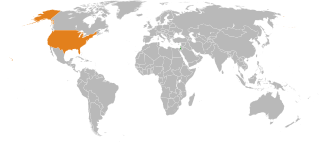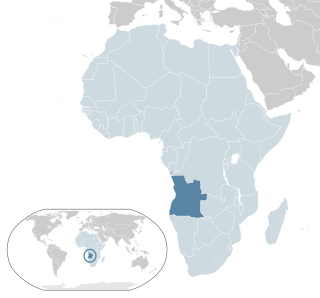 | |
Angola | Israel |
|---|---|
Angola and Israel established diplomatic relations in 1993. In 1995, Israel opened an embassy in Luanda and in 2000, Angola opened an embassy in Tel Aviv.
 | |
Angola | Israel |
|---|---|
Angola and Israel established diplomatic relations in 1993. In 1995, Israel opened an embassy in Luanda and in 2000, Angola opened an embassy in Tel Aviv.

The Israeli government aided the National Liberation Front of Angola in 1963 and 1969, during the Angolan War of Independence. In the 1960s, Holden Roberto, head of the NFLA, visited Israel and FNLA members were sent to Israel for training. In the 1970s, Israel shipped arms to the FNLA through Zaire. [1]
Angola and Israel established relations on April 16th 1992, following the end of the Cold War [2] .
The Israeli embassy in Luanda opened in 1995, and Tamar Golan, who had worked to maintain Israeli contacts with African countries in the previous decades, was appointed the Israeli ambassador. Tamar Golan left this post in 2002, but returned to Angola later on upon the request of the Angolan President José Eduardo dos Santos to help establish a taskforce, under the auspices of the UN, for the removal of landmines. The Israeli company "Geomine" provided Angola with mine detecting equipment, in order to facilitate their removal. [3]
President Dos Santos visited Israel in 2005. In March 2006, the trade volume between the two countries amounted to $400 million. [4]
In August 2012, the Angolan president took a three-day visit to Jerusalem, where the governments of Angola and Israel ratified an agreement in Tel Aviv to strengthen the bonds between both countries. Israeli President Shimon Peres said that this should be based on the fields of science and technology, economy, and security, and the Angolan president expressed the desire to continue with the bilateral cooperation in health, agriculture, science and technology, and the formation of Angolan experts. [5]
In 2016, Angola voted in favour of UN Security Council Resolution 2334, condemning Israeli settlements in East Jerusalem and the West Bank as illegal [6] . In response, Israeli Prime Minister Netanyahu cancelled Israeli aid to Angola [7] [8] .
In 2018, Angola condemned Israeli violence against Palestinians, after the US moving its embassy to Jerusalem caused an uptick in tensions [9] [10] .
In October 2023, Angolan president Joao Lourenco called for Israeli efforts to prevent a humanitarian disaster following the outbreak of the 2023 Israel-Hamas War, saying: “while acknowledging Israel's right to defend itself and protect the lives of its citizens, the truth is that the Palestinian people also possess the same right. They have been living for decades in a continuous occupation and annexation of parts of their territory - a situation deemed unacceptable in the 21st century.” [11] [12]

The National Front for the Liberation of Angola is a political party and former militant organisation that fought for Angolan independence from Portugal in the war of independence, under the leadership of Holden Roberto.

Since the 1960s, the United States has been a strong supporter of Israel. It has played a key role in the promotion of good relations between Israel and its neighbouring Arab states—notably Jordan, Lebanon, Egypt—while holding off hostility from countries such as Syria and Iran. Relations with Israel are an important factor in the U.S. government's overall foreign policy in the Middle East, and the U.S. Congress has placed considerable importance on the maintenance of a supportive relationship.

The status of Jerusalem has been described as "one of the most intractable issues in the Israeli–Palestinian conflict" due to the long-running territorial dispute between Israel and the Palestinians, both of which claim it as their capital city. Part of this issue of sovereignty is tied to concerns over access to holy sites in the Abrahamic religions; the current religious environment in Jerusalem is upheld by the "Status Quo" of the former Ottoman Empire. As the Israeli–Palestinian peace process has primarily navigated the option of a two-state solution, one of the largest points of contention has been East Jerusalem, which was part of the Jordanian-annexed West Bank until the beginning of the Israeli occupation in 1967.

The State of Israel and the Republic of Turkey formally established diplomatic relations in March 1949. Less than a year after the Israeli Declaration of Independence, Turkey recognized Israeli sovereignty, making it the world's first Muslim-majority country to do so. Both countries gave high priority to bilateral cooperation in the areas of diplomacy and military/strategic ties, while sharing concerns with respect to the regional instabilities in the Middle East. In recent decades, particularly under Turkey's Erdoğan administration, the two countries' relationship with each other has deteriorated considerably. However, diplomatic ties were reinstated after a successful normalization initiative in mid-2022.

The State of Israel is represented in the Russian Federation through an embassy in Moscow and a consulate-general in Yekaterinburg. Russia is represented in Israel through an embassy in Tel Aviv and a consulate in Haifa. Russia is a member of the Quartet on the Middle East. For many years, Israel was a haven for Russian Jews. This was especially the case during the aliyah from the Soviet Union in the 1970s and 1990s. Israel and the Soviet Union, Russia's predecessor state, were on opposing sides during the Cold War. However, the relationship between Israel and Russia has improved significantly since the early 2000s, with the election of the more pro-Israel Russian leader Vladimir Putin, and the election of the more pro-Russia Israeli leader Ariel Sharon. Putin has had a close relationship with long-serving Israeli prime minister Benjamin Netanyahu.

Israel–Ukraine relations are foreign relations between Israel and Ukraine. Both countries recognized each other on 11 May 1949 as the Ukrainian SSR and established de jure diplomatic relations on 26 December 1991 when Ukraine became independent. Israel has an embassy in Kyiv. Ukraine has an embassy in Tel Aviv and a consulate-general in Haifa. There are 30,000 Ukrainians settled in Israel, while Ukraine has one of Europe's largest Jewish communities. Ukraine is also the first state, apart from Israel, to have had both a Jewish president and prime minister simultaneously.

Relations between Israel and the Czech Republic, and its predecessor state Czechoslovakia, have varied widely over time.

Israel–Singapore relations, also referred to as Israeli–Singaporean relations, refers to the bilateral relations between the State of Israel and the Republic of Singapore. Relations between the two countries have been extremely cordial and friendly for more than half a century, which are influenced by their similar geopolitical state of affairs, being relatively small states surrounded by larger neighbors hostile to their continued existence.

This is a timeline of the development of and controversy over Israeli settlements. As of January 30, 2022 the West Bank settlement population was 490,493 and the settler population in the Golan Heights was almost 27,000 and in East Jerusalem the settler population was around 220,000.
Reactions to the Gaza flotilla raid on 31 May 2010 ranged from fierce condemnation to strong support for Israel.

Bilateral relations between Australia and Israel, were established in 1949. Australia has an embassy in Tel Aviv and Israel has an embassy in Canberra.

International relations between Argentina and Israel, have existed for decades. Both countries established diplomatic relations on 31 May 1949.

Political relations between the State of Palestine and the United States have been complex and strained since the 1960s. While the U.S. does not recognize the State of Palestine, it recognizes the Palestine Liberation Organization (PLO) as the legitimate representative entity for the Palestinian people; following the Oslo Accords, it recognized the Palestinian National Authority as the legitimate Palestinian government of the Palestinian territories.

Israel–Nauru relations are diplomatic and other relations between Israel and Nauru. Israel has a non-resident ambassador in Jerusalem and honorary consulate (Yaren), Nauru has an honorary consulate.

An increase of violence occurred in the Israeli–Palestinian conflict starting in the autumn of 2015 and lasting into the first half of 2016. It was called the "Intifada of the Individuals" by Israeli sources, the Knife Intifada, Stabbing Intifada or Jerusalem Intifada by international sources because of the many stabbings in Jerusalem, or Habba by Palestinian sources. 38 Israelis and 235 Palestinians were killed in the violence. 558 Israelis and thousands of Palestinians were injured.

United Nations Security Council Resolution 2334 was adopted on 23 December 2016. It concerns the Israeli settlements in "Palestinian territories occupied since 1967, including East Jerusalem". The resolution passed in a 14–0 vote by members of the United Nations Security Council (UNSC). Four members with United Nations Security Council veto power voted for the resolution, while the United States abstained.

On the morning of 26 September 2017, a Palestinian gunman opened fire at Israeli security guards at the entrance gate of Har Adar, an Israeli settlement and affluent residential border community of Jerusalem located largely on the other side of the green line within the West Bank. Three Israeli security guards were killed and one was injured. The gunman was shot dead by the remaining guards. The Israeli authorities described the attack as an 'act of terrorism'.

On March 25, 2019, the United States officially recognized the Golan Heights as being under the sovereignty of Israel. Signed into effect by the Trump administration, the U.S. presidential proclamation marked the first instance of any country recognizing Israeli sovereignty over the Golan Heights; the territory is viewed as part of Syria under international law, though it has been under an Israeli military occupation since the 1967 Arab–Israeli War. In 1981, Israel's government passed the Golan Heights Law — a de facto annexation of the territory.

The recorded history of the Jews in Angola stretches from the Middle Ages to modern times. A very small community of Jews lives in Angola mostly in the capital city of Luanda with a handful scattered elsewhere of mixed origins and backgrounds. There are also a number of transitory Israeli businesspeople living in Angola.
The Israel–Hamas war sparked a major diplomatic crisis, with many countries around the world reacting strongly to the conflict that affected the momentum of regional relations. At least nine countries took the drastic step of recalling their ambassadors and cutting diplomatic ties with Israel. The conflict has also resulted in a renewed focus on a two-state solution to the ongoing conflict.
{{cite web}}: |last= has generic name (help)